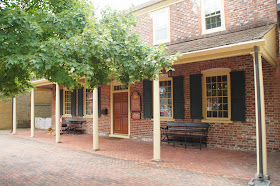The top photo shows the eastern side of the Custom House while the bottom photo shows the northern side. The Custom House is located at the corner of High and Water Streets and was the official Port of Entry into Chestertown, MD. The original Custom House no longer stands, having been replaced by this beautiful Flemish bond brick building. The large building was constructed in 1746 and was the home of Thomas Ringgold. Mr. Ringgold was a lawyer, merchant and advocate of American liberty. The building was a three story house. The first floor was used as a warehouse with living quarters on the upper two floors. It was near this site that on May 23, 1774 a band of citizens, incensed by the closing of the Port of Boston following it's "Tea Party", allegedly boarded the British William Geddes' brigantine and threw it's cargo of tea into the Chester River. It was also well known that defender of America's liberty, Mr. Ringgold, was also a large-scale slave trader whose ships brought hundreds of captive Africans to shore to work on the plantations of the surrounding Chesapeake area. Following is one of the slave sale advertisements dated 1760.

|


































































